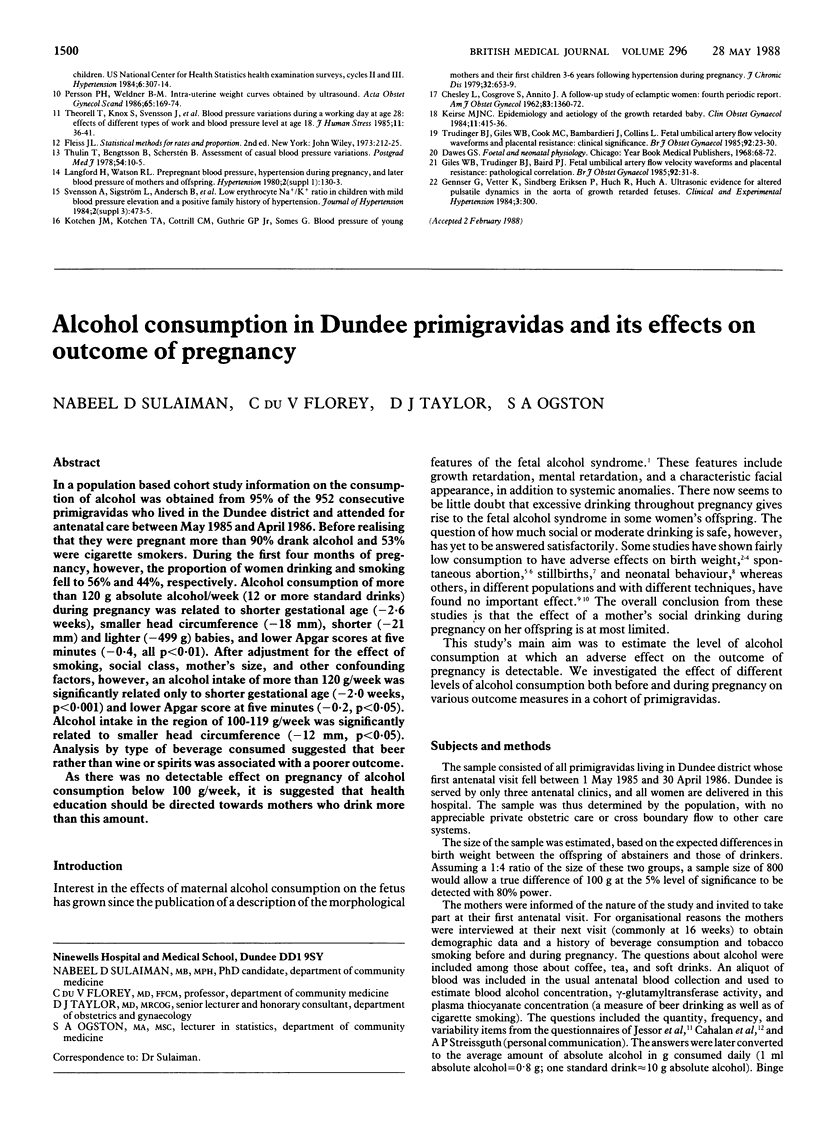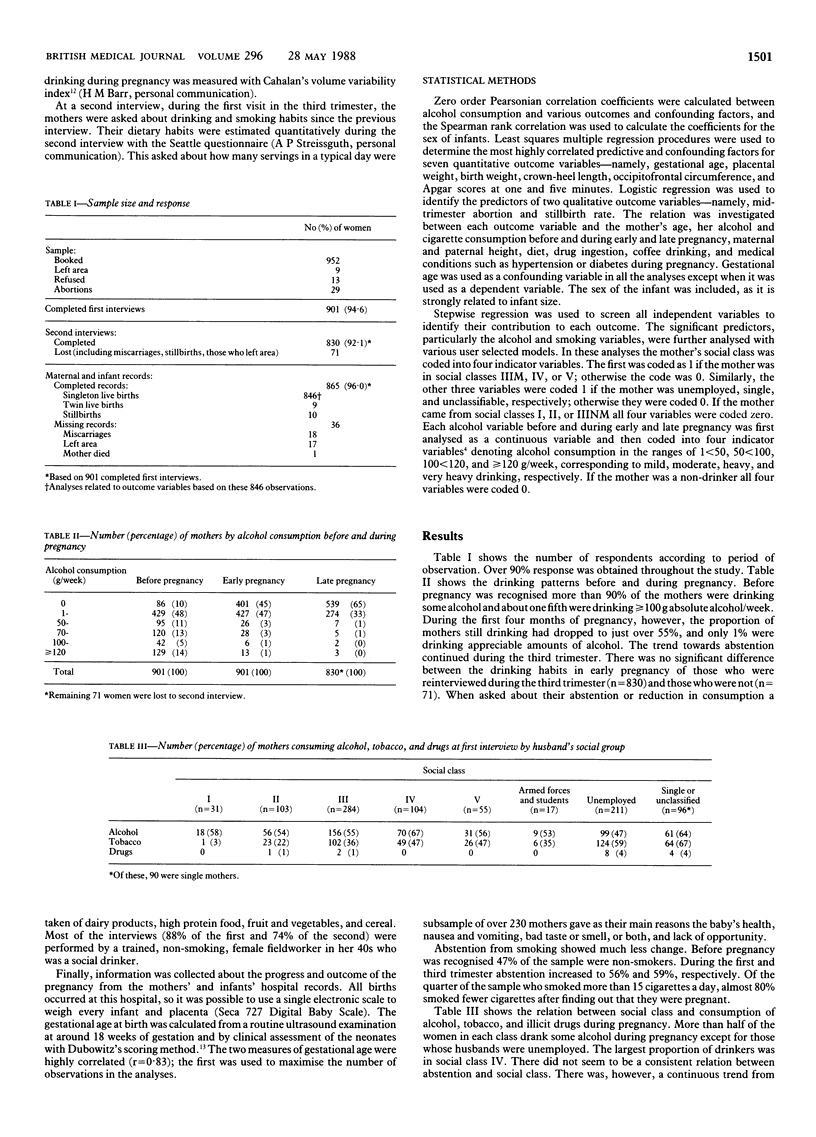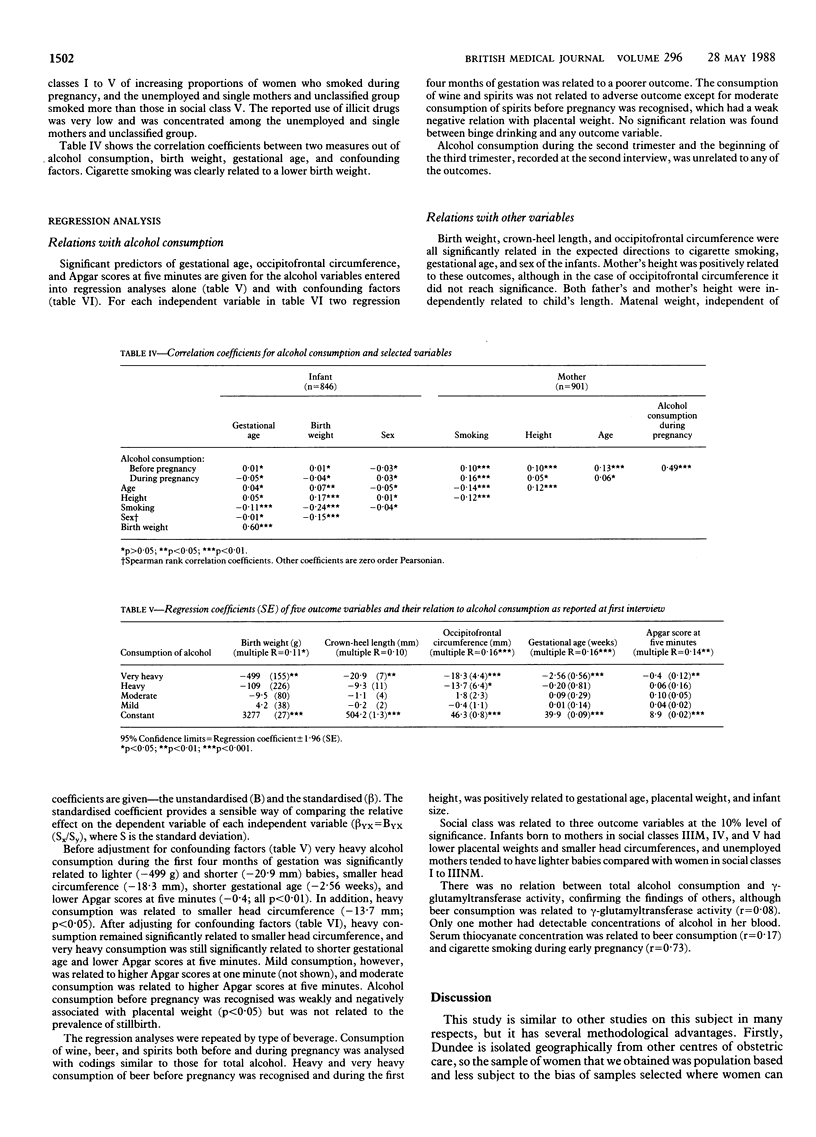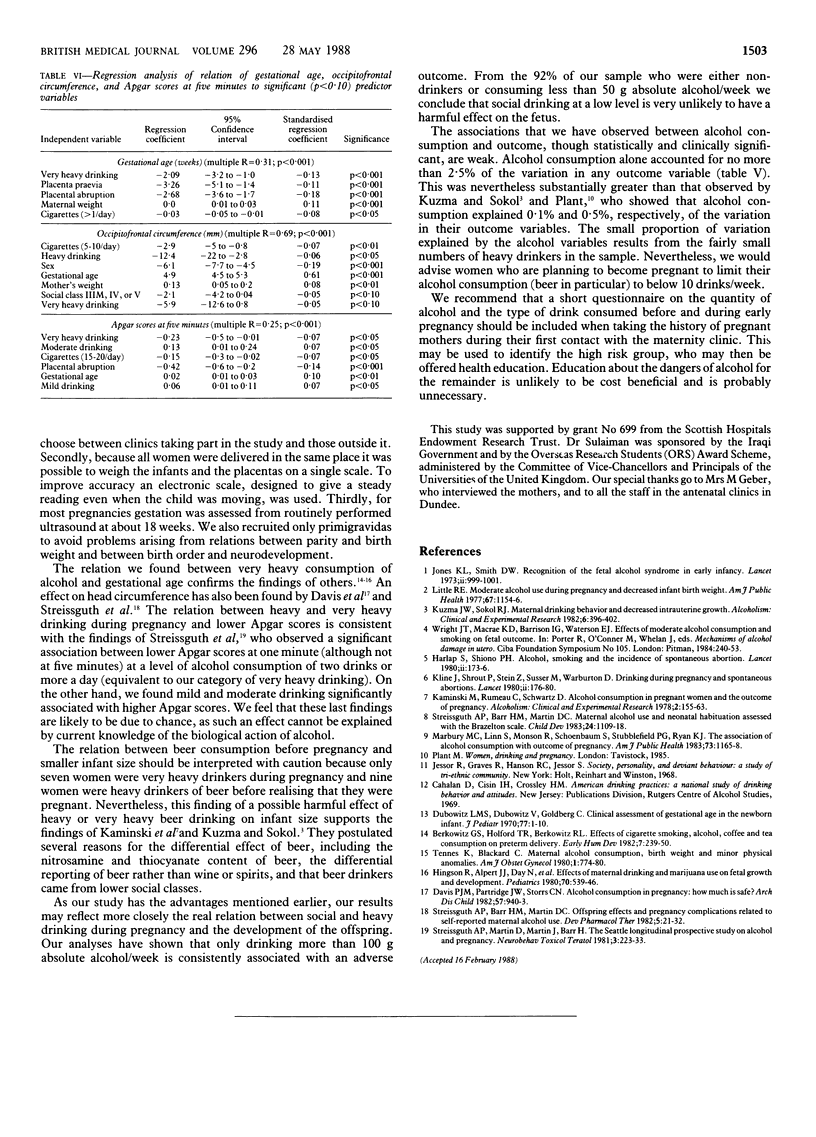Abstract
In a population based cohort study information on the consumption of alcohol was obtained from 95% of the 952 consecutive primigravidas who lived in the Dundee district and attended for antenatal care between May 1985 and April 1986. Before realising that they were pregnant more than 90% drank alcohol and 53% were cigarette smokers. During the first four months of pregnancy, however, the proportion of women drinking and smoking fell to 56% and 44%, respectively. Alcohol consumption of more than 120 g absolute alcohol/week (12 or more standard drinks) during pregnancy was related to shorter gestational age (-2·6 weeks), smaller head circumference (-18 mm), shorter (-21 mm) and lighter (-499 g) babies, and lower Apgar scores at five minutes (-0·4, all p<0·01). After adjustment for the effect of smoking, social class, mother's size, and other confounding factors, however, an alcohol intake of more than 120 g/week was significantly related only to shorter gestational age (-2·0 weeks, p<0·001) and lower Apgar score at five minutes (-0·2, p<0·05). Alcohol intake in the region of 100-119 g/week was significantly related to smaller head circumference (-12 mm, p<0·05). Analysis by type of beverage consumed suggested that beer rather than wine or spirits was associated with a poorer outcome.
As there was no detectable effect on pregnancy of alcohol consumption below 100 g/week, it is suggested that health education should be directed towards mothers who drink more than this amount.
Full text
PDF



Selected References
These references are in PubMed. This may not be the complete list of references from this article.
- Berkowitz G. S., Holford T. R., Berkowitz R. L. Effects of cigarette smoking, alcohol, coffee and tea consumption on preterm delivery. Early Hum Dev. 1982 Dec 6;7(3):239–250. doi: 10.1016/0378-3782(82)90086-x. [DOI] [PubMed] [Google Scholar]
- Davis P. J., Partridge J. W., Storrs C. N. Alcohol consumption in pregnancy. How much is safe? Arch Dis Child. 1982 Dec;57(12):940–943. doi: 10.1136/adc.57.12.940. [DOI] [PMC free article] [PubMed] [Google Scholar]
- Dubowitz L. M., Dubowitz V., Goldberg C. Clinical assessment of gestational age in the newborn infant. J Pediatr. 1970 Jul;77(1):1–10. doi: 10.1016/s0022-3476(70)80038-5. [DOI] [PubMed] [Google Scholar]
- Harlap S., Shiono P. H. Alcohol, smoking, and incidence of spontaneous abortions in the first and second trimester. Lancet. 1980 Jul 26;2(8187):173–176. doi: 10.1016/s0140-6736(80)90061-6. [DOI] [PubMed] [Google Scholar]
- Hingson R., Alpert J. J., Day N., Dooling E., Kayne H., Morelock S., Oppenheimer E., Zuckerman B. Effects of maternal drinking and marijuana use on fetal growth and development. Pediatrics. 1982 Oct;70(4):539–546. [PubMed] [Google Scholar]
- Jones K. L., Smith D. W. Recognition of the fetal alcohol syndrome in early infancy. Lancet. 1973 Nov 3;302(7836):999–1001. doi: 10.1016/s0140-6736(73)91092-1. [DOI] [PubMed] [Google Scholar]
- Kaminski M., Rumeau C., Schwartz D. Alcohol consumption in pregnant women and the outcome of pregnancy. Alcohol Clin Exp Res. 1978 Apr;2(2):155–163. doi: 10.1111/j.1530-0277.1978.tb04716.x. [DOI] [PubMed] [Google Scholar]
- Kline J., Shrout P., Stein Z., Susser M., Warburton D. Drinking during pregnancy and spontaneous abortion. Lancet. 1980 Jul 26;2(8187):176–180. doi: 10.1016/s0140-6736(80)90062-8. [DOI] [PubMed] [Google Scholar]
- Kuzma J. W., Sokol R. J. Maternal drinking behavior and decreased intrauterine growth. Alcohol Clin Exp Res. 1982 Summer;6(3):396–402. doi: 10.1111/j.1530-0277.1982.tb04998.x. [DOI] [PubMed] [Google Scholar]
- Little R. E. Moderate alcohol use during pregnancy and decreased infant birth weight. Am J Public Health. 1977 Dec;67(12):1154–1156. doi: 10.2105/ajph.67.12.1154. [DOI] [PMC free article] [PubMed] [Google Scholar]
- Marbury M. C., Linn S., Monson R., Schoenbaum S., Stubblefield P. G., Ryan K. J. The association of alcohol consumption with outcome of pregnancy. Am J Public Health. 1983 Oct;73(10):1165–1168. doi: 10.2105/ajph.73.10.1165. [DOI] [PMC free article] [PubMed] [Google Scholar]
- Streissguth A. P., Barr H. M., Martin D. C. Maternal alcohol use and neonatal habituation assessed with the Brazelton scale. Child Dev. 1983 Oct;54(5):1109–1118. [PubMed] [Google Scholar]
- Streissguth A. P., Barr H. M., Martin D. C. Offspring effects and pregnancy complications related to self-reported maternal alcohol use. Dev Pharmacol Ther. 1982;5(1-2):21–32. [PubMed] [Google Scholar]
- Streissguth A. P., Martin D. C., Martin J. C., Barr H. M. The Seattle longitudinal prospective study on alcohol and pregnancy. Neurobehav Toxicol Teratol. 1981 Summer;3(2):223–233. [PubMed] [Google Scholar]
- Tennes K., Blackard C. Maternal alcohol consumption, birth weight, and minor physical anomalies. Am J Obstet Gynecol. 1980 Dec 1;138(7 Pt 1):774–780. doi: 10.1016/s0002-9378(16)32735-1. [DOI] [PubMed] [Google Scholar]
- Wright J. T., MacRae K. D., Barrison I. G., Waterson E. J. Effects of moderate alcohol consumption and smoking on fetal outcome. Ciba Found Symp. 1984;105:240–253. doi: 10.1002/9780470720868.ch14. [DOI] [PubMed] [Google Scholar]


